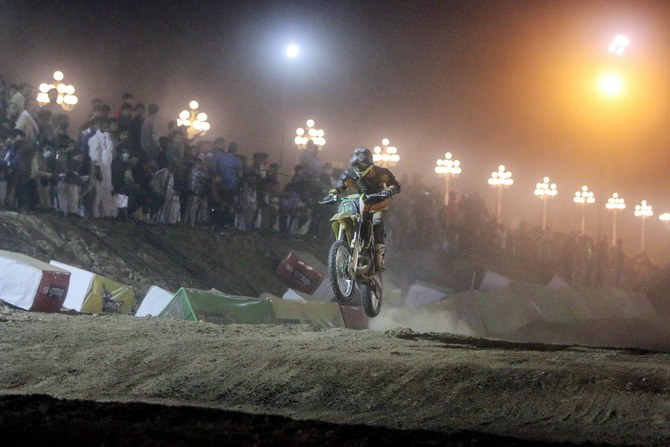KALA SHAH KAKU: Pakistan held its first professional motocross race in sixteen years on Sunday where racers performed a variety of dramatic table-top jumps, whoops and sweeper turns at break-neck speeds, and close to ten thousand people gathered to watch in a sign of the sport’s growing popularity in the South Asian nation.
Motocross, short for motorcycling cross-country and popularly called dirt biking, is a type of off-road motorcycle race run on bumpy tracks that uses natural terrain features or man-made jumps and obstacles.
The sport first came to Pakistan in the late 80’s when it thrived on automobile and tobacco sponsorships. But once the sponsors lost interest, the sport died, said Ahsan Iqbal, a sales executive and former racer who said he had traveled to the newly minted 1.6 km professional track in Kala Shah Kaku, 20 kilometers west of Lahore, to support young bikers and help revive the sport.
The track and Sunday’s race are the brainchild of adventure motorcyclist Moin Khan, the founder of Pakistan Motocross and the day’s winner in the open, professional racing class. The bulk of Sunday’s race, held in a housing colony, was funded by real estate tycoon Shoaib Afzal Malik’s company SA Gardens.
“For the next few years, my aim is to help riders get sponsorships so they can maintain their bikes, so they can afford their passion and just race,” Khan told Arab News after his victory lap. “The only way to make this sport grow is to make it big enough for the government to take notice.”
Throwing a victory sign in the air at gushing fans, Moin added: “This is our first lap for Pakistan!”
Motocross evolved from off-road motorcycle trials in the United Kingdom in the 1950’s and is now a $5 billon industry worldwide. Much cheaper than the closest alternatives of car and grand prix racing, it was once considered the working man’s motor sport. In developing countries like Pakistan, however, it is proving to be an expensive hobby.
In Pakistan, just like in Afghanistan and Iran, local manufacturers do not produce off-road motorcycles designed for tackling non-paved surfaces at high speed. Taxes on the import of bikes, their spare parts and safety gear thus jack prices up to double, and sometimes triple, the base cost, with waiting periods of up to a year.
“It’s a rich man’s sport,” said Adeel Mughal, a motorcycle showroom owner from Rawalpindi who was competing in Sunday’s race. “If you want to do this professionally, you can’t just dress up your regular motorcycle and take it to the dirt.”
On average, getting a motocross bike to Pakistan legally can cost riders upwards of $20,000, several bikers at Sunday’s event said. Many are thus opting to smuggle vehicles into the country. Serious enthusiasts say they have had to borrow motorcycles from friends, take out huge bank loans and even invest in informal saving funds like ‘kitty parties’ to raise enough money.
“I grew up with a group of boys living the biker life, racing our ordinary motorcycles all over Murree Road,” Mughal said, referring to a main boulevard that runs through Islamabad and Rawalpindi. “We didn’t know anything about safety then. I lost seven friends to the road. We were young and relentless.”
Another rider, Ibrahim Shah, a rising star on the motocross scene who goes by his stage name Abraham Lincoln, told Arab News: “All our lives, our families told us motorcycle racing was too dangerous, but today they’ve come out to support us because they know we’re doing it safely.”
Across the border in Afghanistan, the motocross industry’s ascent has been swift, supported by the government, the national olympic committee and generous private sector funding, said Mujeebullah Rahmani, Secretary General of the Afghanistan Motorcycle Federation. He said Afghan riders had arrived in Pakistan to compete in a race earlier this year but were unable to get approval from Pakistan’s government to bring their motorcycles along.
“We (Afghans) were refugees in Pakistan when we learnt how to play cricket,” Rahmani said, referring to the game adopted by Afghans in the refugee camps of cricket-loving Pakistan, where more than 3 million fled a Soviet invasion and civil war in the 1980s and 1990s. “Now we hope motorcycles will unite us.”
According to Shambhu Nath, a research manager at the Dublin-based Fact.MR market research firm, annual participation in motocross sports in Asia is set to increase at an average rate of 15 percent per year due to rising disposable income and per capita expenditure of consumers in the region. A maturing tourism industry is also proving to be a fillip.
But Shah like other enthusiasts and professional racers said without government support and subsidies, the sport had little chance of thriving in Pakistan.
“Not a single local manufacturer is making the bikes we need. My safety gear alone has cost me $1,500,” he said. “Pakistan makes all this motocross gear for export but the riders have to buy the same thing at high prices from other countries.”
“The sport is here, the passion is here. Now the government just needs to help us grow,” Shah said. Then he clipped his helmet and whizzed down the dusty track.
After sixteen years, motocross racing makes an expensive comeback in Pakistan
After sixteen years, motocross racing makes an expensive comeback in Pakistan

- 10,000 people gathered for a dirt biking competition on Sunday at a newly minted professional track on the outskirts of Lahore
- Motocross thrived in Pakistan in the late 80’s but fizzled out when tobacco and automobile sponsors lost interest















